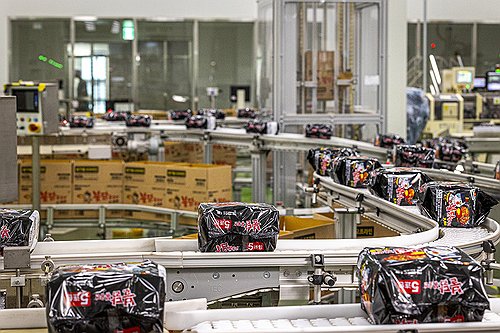(Seoul=Yonhap Infomax) Su In Jeong – Samyang Foods Co., the South Korean instant noodle maker known for its spicy 'Buldak' products, will expand its production lines at its Jiaxing plant in China from six to eight, increasing annual capacity by approximately 38%.
On the same day, the company announced plans to sell its entire treasury stock holdings worth 102.7 billion won ($78.5 million), with proceeds expected to be invested in expanding facilities both in China and domestically.

According to a regulatory filing with the Financial Supervisory Service on the 21st, Samyang Foods [003230] revised its investment plan for its local production subsidiary in Jiaxing, China, on the 19th. The company will now expand from the original six lines (five for bag noodles, one for cup noodles) to eight lines (six for bag noodles, two for cup noodles).
With this decision, the Jiaxing plant's capacity will rise by about 38% compared to the previous plan, enabling annual production of up to 1.13 billion Buldak products, up from 840 million.
The estimated investment has been revised upward by 5.8 billion won to 207.2 billion won ($158.3 million). Although the cost for the two additional lines was initially estimated at around 23 billion won, the company explained that overall investment did not increase significantly due to cost savings in construction.
The decision to expand before the plant's completion reflects the company's strong confidence in rising local demand. Samyang Foods' Chinese subsidiary has operated since February 2022, with sales growing rapidly each year. The company noted that sales growth is outpacing inventory depletion, prompting the expansion.
Sales at the Chinese subsidiary surged from 680 million yuan in 2022 to 2.1 billion yuan last year, with cumulative sales reaching 2.21 billion yuan in the third quarter of this year. According to third-quarter IR materials, the Chinese subsidiary's sales (184.6 billion won) have surpassed those of the U.S. subsidiary (155.5 billion won).
Woo Jeong Kwon, analyst at Kyobo Securities, said, "Penetration in China's tier-1 cities is at 100%, but tier-2 cities are at about 60%, and expansion into tier-3 cities is just beginning. Since tier-1 cities account for only about 30% of total Chinese instant noodle demand, there is significant room for growth in tier-2 and tier-3 cities."
Samyang Foods' market share in China remains below 3%, and the company is focusing on expanding online and offline sales channels rather than market share itself.
Addressing concerns about potential delays due to the expansion, the company stated, "We are targeting completion by January 31, 2027."
On the 19th, Samyang Foods also disclosed plans to dispose of all its treasury shares worth 102.7 billion won ($78.5 million). The funds will be used for debt repayment and facility investments, including the Chinese plant.
The proceeds are expected to be used for establishing a new factory in Wonju, South Korea, to produce soup bases for the Chinese plant. According to the quarterly report, Samyang Foods will invest 78.1 billion won from September this year through January 2027 to supplement facilities, with the entire amount allocated to the new Wonju soup factory.
The treasury shares being sold were acquired in 2022 for 7 billion won. Since then, Samyang Foods' share price has surged 1,442.95% as of the previous day.
Following the sale, the company plans to focus on shareholder return policies centered on corporate growth. A Samyang Foods official stated, "Our future shareholder return policy will pursue value enhancement by linking investment to profitability and securing growth in a virtuous cycle. There are no plans for additional treasury share buybacks."
sijung@yna.co.kr
(End)
Copyright © Yonhap Infomax Unauthorized reproduction and redistribution prohibited.

